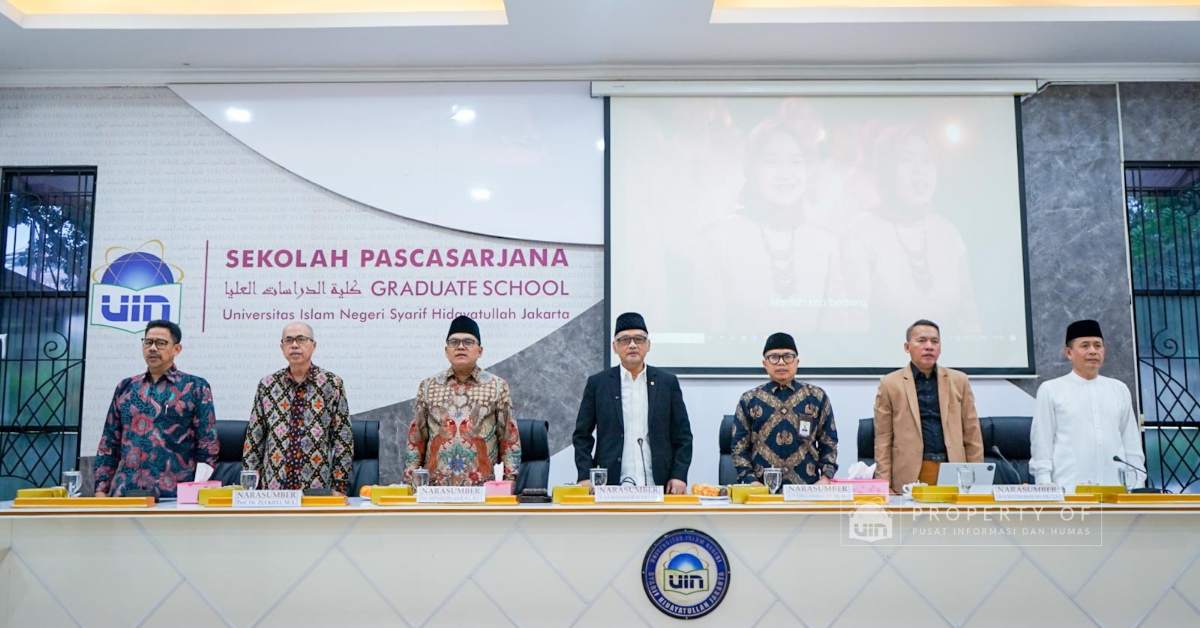UIN Jakarta Collaborates with Ministry of Hajj and Umrah to Strengthen Hajj Governance
Prof. Suwito Auditorium, UIN Online News — The Graduate School (SPS) of Syarif Hidayatullah State Islamic University Jakarta, in collaboration with the Hajj Financial Management Agency (BPKH) and the Ministry of Hajj and Umrah of the Republic of Indonesia, held a public lecture titled “Equitable and Sustainable Hajj Fund Management in BPKH Securities Investment” at the Prof. Suwito Auditorium on Thursday (September 11, 2025).
The event featured the Indonesian Minister of Hajj and Umrah, Dr. KH Moch Irfan Yusuf, M.Si., accompanied by UIN Jakarta Rector Prof. Asep Saepudin Jahar, M.A., Ph.D., SPS Director Dr. Zulkifli, M.A., Chief Investment Officer and UIII Lecturer Dr. H. Indra Gunawan, S.E., S.I.P., M.Sc., M.Cs., UIN Jakarta Lecturer and Hajj Commission Chair Dr. H. Mustolih Siradj, S.H.I., M.H., with SPS student Desty Eka Putri Sari serving as moderator.
In his remarks, Asep Saipudin Jahar assured that UIN Jakarta will collaborate and engage accordingly in dialogue with the Minister of Hajj and Umrah, BPKH representatives, directors, scholars, and other stakeholders.
“I am very pleased with the presence of these prominent figures today, especially the Ministry of Hajj and Umrah, which plays a strategic role in strengthening the governance of hajj and umrah services,” he expressed.
The rector of UIN Jakarta further emphasized that organizing hajj and umrah is an annual agenda requiring comprehensive preparation.
“From personnel and health services to training andcounseling, everything must be well-prepared. Hajj and umrah are both a great mandate and a responsibility of the Muslim ummah, which must be carried out with integrity,” he stated.
Then, Dr. KH Moch Irfan Yusuf started the agenda by outlining three key indicators of successful hajj: perfect completion of hajj rituals, improvement of the hajj economic ecosystem, and good ethics during the rituals.
“Hajj is not only about the rituals, but also how the hajj economy circulates and benefits society, and how Indonesian pilgrims return home with stronger patriotism and enhanced civilizational values,” he noted.
He stressed that nearly 90 percent of Indonesian Muslims aspire to perform hajj, and the government is committed to ensuring the best possible services.
“Rest assured, we want to guarantee that Indonesian pilgrims receive the best services not only for rituals but also in terms of health, economy, and civilizational benefits,” he assured.
Dr. Indra Gunawan (UIII) added that the waiting period for hajj in Indonesia remains excessively long, ranging from 11 to 48 years, with unequal quota distribution across regions. He suggested that family members should be allowed to substitute if the registered pilgrim is unable to depart.
He also encouraged greater digitalization of hajj registration and savings through biometrics and fintech for better transparency, alongside more productive investments such as acquiring hotel assets in Saudi Arabia to reduce capital outflow reaching tens of trillions of rupiah annually.
“Today, opening a bank account can already be done with biometrics—face or fingerprint verification. This means Hajj registration could also be simplified through fintech, making savings more transparent,” he concluded.
(Fathan Rangga I./Fauziah M./Zaenal M./Muhamad Arifin Ilham/Photo: Tiara Abdhie)

